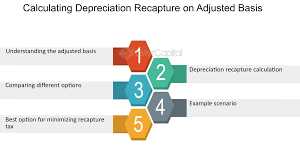Depreciation Recapture: Definition, Calculation, and Examples

Depreciation recapture is a term used in taxation that refers to the process of reclaiming the tax benefits that were previously enjoyed by an individual or business through the depreciation of an asset. When an asset is depreciated, its value is gradually reduced over time to reflect its wear and tear or obsolescence. This reduction in value allows the owner to claim tax deductions, which can lower their taxable income.
However, if the asset is sold or disposed of before the end of its useful life, the IRS requires the owner to “recapture” a portion of the previously claimed depreciation deductions. This means that the owner must report the recaptured depreciation as ordinary income and pay taxes on it at their regular tax rate.
Calculation of Depreciation Recapture
The calculation of depreciation recapture depends on several factors, including the type of asset, the method of depreciation used, and the sale price of the asset. Generally, the recapture amount is equal to the lesser of the depreciation claimed or the gain realized from the sale of the asset.
Here is a simplified example to illustrate the calculation:
| Asset Purchase Price | $50,000 |
|---|---|
| Accumulated Depreciation | $20,000 |
| Adjusted Basis | $30,000 |
| Sale Price | $40,000 |
| Depreciation Recapture | $10,000 |
Examples of Depreciation Recapture
1. A real estate investor sells a rental property that was depreciated over 27.5 years. The recaptured depreciation would be taxed at the investor’s ordinary income tax rate.
2. A business owner sells a piece of equipment that was depreciated over 5 years. The recaptured depreciation would be taxed at the business owner’s ordinary income tax rate.
3. An individual sells a personal vehicle that was used for business purposes and claimed depreciation deductions. The recaptured depreciation would be taxed at the individual’s ordinary income tax rate.
It is important to note that the specific tax rules and rates for depreciation recapture may vary depending on the jurisdiction and the individual’s tax situation. Consulting with a tax professional is recommended to ensure compliance with applicable tax laws.

Emily Bibb simplifies finance through bestselling books and articles, bridging complex concepts for everyday understanding. Engaging audiences via social media, she shares insights for financial success. Active in seminars and philanthropy, Bibb aims to create a more financially informed society, driven by her passion for empowering others.
